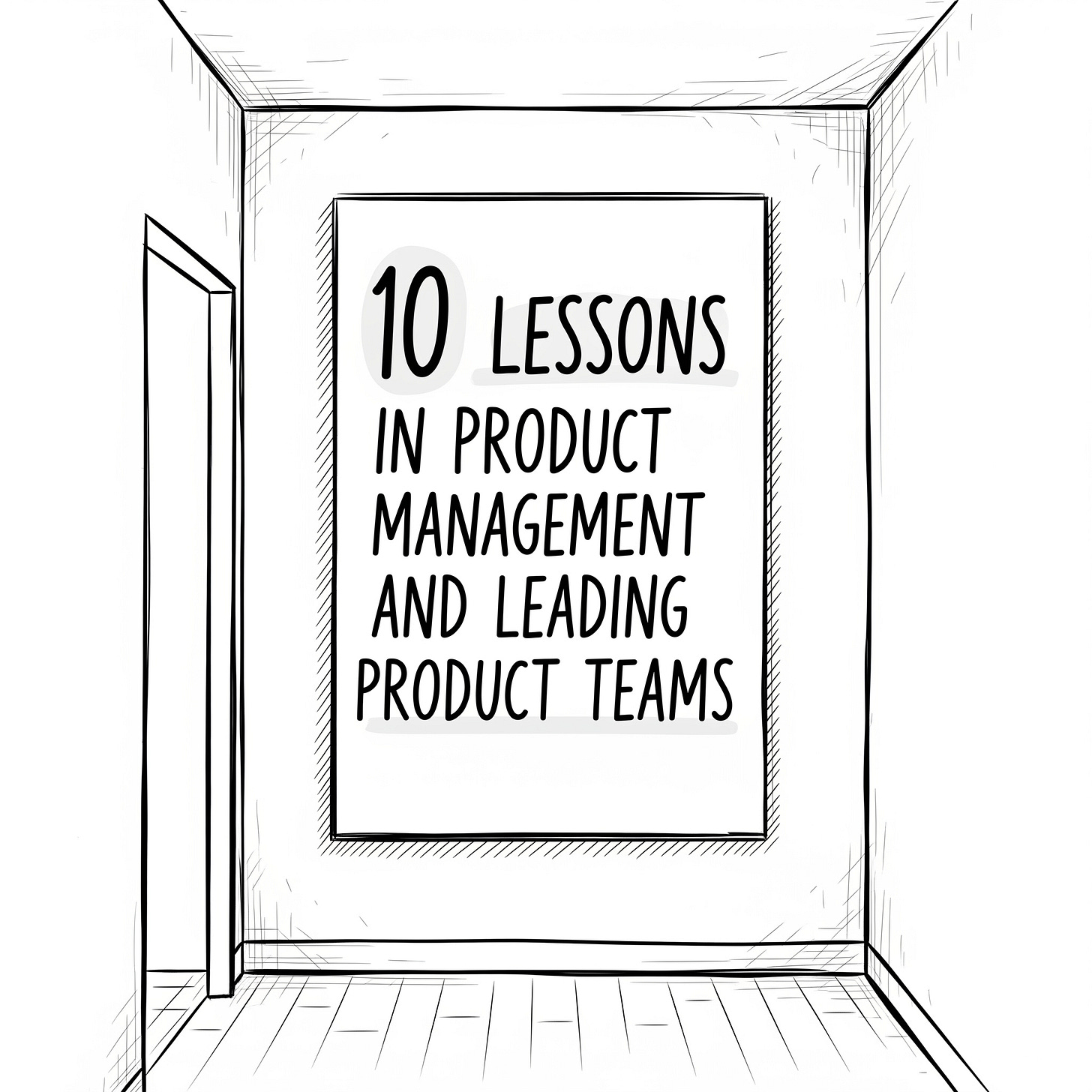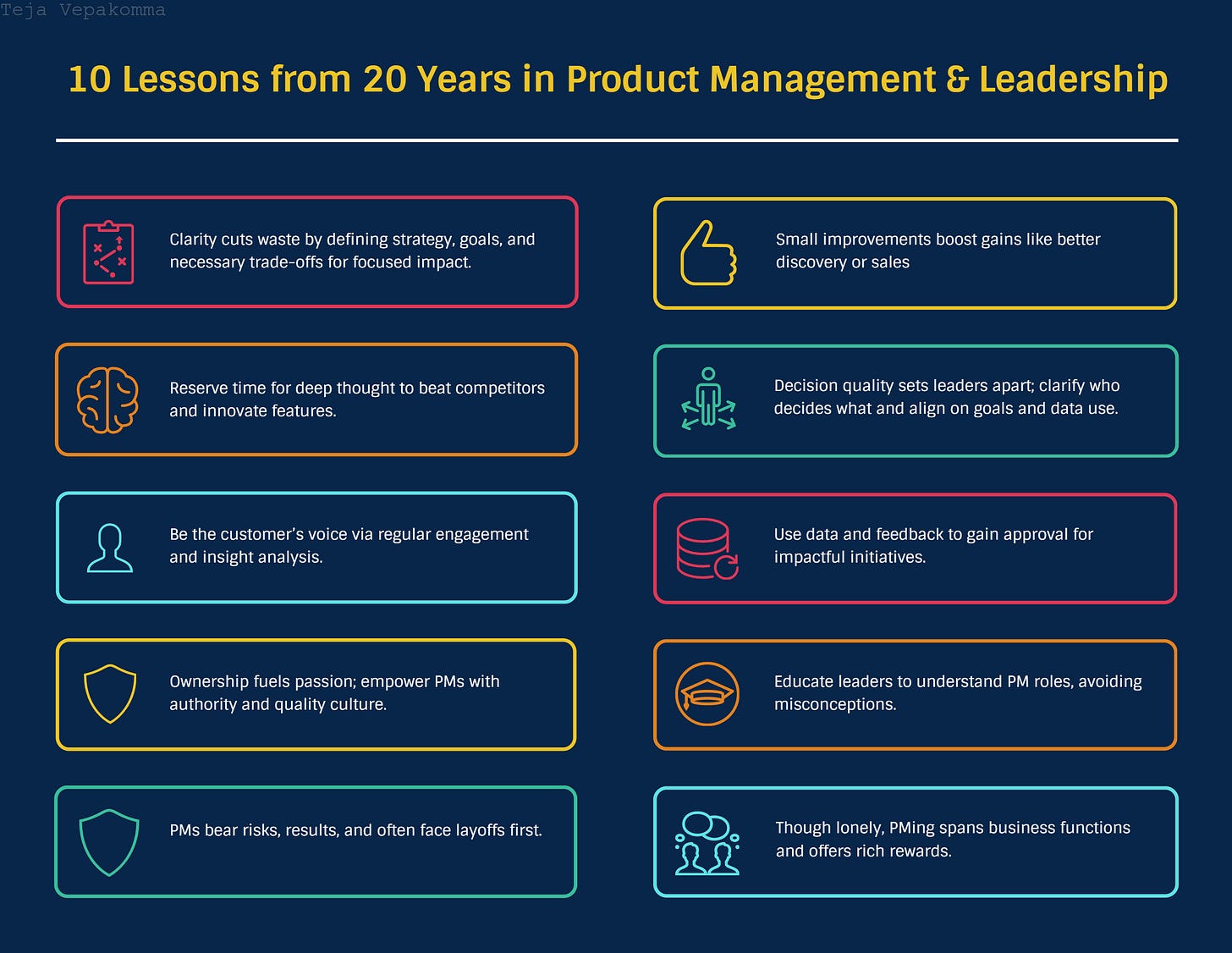10 Lessons from 2 decades in Product Management
If you are leading Product Teams or a Founder, you'll find these helpful...
I have worked on Products and led Product Teams for 20 years now, across 2 countries and 5 different companies and multiple industries. These are common themes across all of them, that should be helpful for product leaders…
Clarity reduces wastage
There is a lot of wastage in companies: unimpactful work getting prioritized, work not aligned to goals, duplicate efforts, etc. Your job as a Product Leader is to provide clarity on what the strategy is, what the goals are, and why. Also, be clear on what trade-offs we are willing to make to reach the goals (including what not to do). This will not only eliminate waste but also give employees a sense of purpose.
Small things have big impact – You don’t need the latest LLM-based feature to have a big impact on your goals. It is often the small things that have the highest impact. These could be things like improving discoverability of a useful feature, educating sales teams on a new feature your team developed, etc.
Busy work is the enemy of impactful work – PMs have a lot on their plate and often spend the majority of their time answering questions and unblocking their teams. But the most impactful work requires deep thought – how are you going to beat your competitors? What’s the next game-changing feature you should introduce? Unless you block your calendar for deep work, these tasks will never get done.
Decision quality – How decisions are made (and the quality of those decisions) is what separates the best orgs from the mediocre ones. Your job as a Product Leader is to provide teams clarity on what decisions they can make, what requires your approval, and so on up the chain. You should also provide clarity on the goals, frameworks, and data to use to back up decisions.
Align with customers – You are the voice of the customer in meetings. You represent the customer. The deeper you know your customers, the more successful you will be. Have a regular cadence to talk to customers and look at customer data and insights.
Managing change upward – This is the most impactful, albeit risky, thing you can do as a PM. Managing change down is easy. To really move the needle, you often need to make changes that require approval from higher-ups. This is often not easy, especially in smaller companies. Use data, evidence on best practices, and customer feedback to get approval for the changes you want to make.
Passion comes from ownership – Teams will be more passionate and dedicated if you give them more ownership. But unless you introduce a culture of quality decision-making, it is hard to provide them with decision authority. Also, to delegate authority, you need to hire experienced PMs.
Product Management is often misunderstood – Your boss has probably never been a PM and will not know what a PM is supposed to do. Many equate it to Project Management – or even worse – Quality Assurance (“Deliver this on time, and make sure there are no issues!”). It’s important to set expectations and clarify to your boss what PMs are supposed to do and who is responsible for what. I would highly recommend one of Marty Cagan’s books or courses to educate your leadership team about Empowered Product Teams.
PMing is risky, not for everyone – PMs should give credit to the team when things go well. But PMs are the only ones responsible for the results when things don’t go well. Just like any business role, there are multiple factors beyond a PM’s control, and it’s easy to miss goals and business outcomes. PMs are also the first in the development team to be laid off in a downturn.
Yes, you are alone in this – Being a PM is a lonely job. You are often operating alone, questioning people, overriding decisions, dealing with conflicts. All this can make you unpopular with the team you work with every single day – although you try your best to be nice. But seeing the customer impact and the business results often more than makes up for this. Spending time with other PMs outside your own company is a great way to exchange notes, hone best practices, and just be surprised how similar your challenges are to other PMs in different organizations in different industries!
Product Management is still the most intellectually rewarding job in tech as it gives you the broadest perspective on the business as your work spans multiple functions.
Let me know what you think and share your perspective in the comments below.
About the Author
Teja Vepakomma is a Product Strategy and Growth consultant to companies. He has many years of experience working in Product Management leadership roles in Global SAAS companies. He’s currently based in Bangalore, India. You can follow or reach out to him on LinkedIn.



